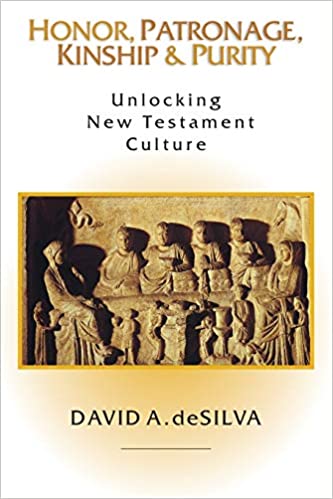Several months ago, I met New Testament scholar David deSilva who has been generous with his time in aiding me in my research for the revision and expansion of The Untold Story of the New Testament Church.
As part of my research, I’ve been working through many of deSilva’s books.
Today I want to feature his superb work Honor, Patronage, Kinship & Purity.
Recently, I was able to catch up with deSilva to talk to him about the book.
Enjoy!
Every reader has one question in their mind when they ask, “What’s your book about?” or “Why did you write this book?” That question is, “What’s in it for me? What am I going to get out of it?” Share with us what readers will gain from reading your book.
The most important benefit is an immersion into the social and cultural world of the first-century Roman empire, including the province of Judea. This will help readers begin to grasp the distance between the assumptions that they bring to the New Testament texts on the basis of their theological traditions and their lived experience of twentieth- and twenty-first century society and culture. When we read the New Testament through our modern cultural and theological lenses, we bring all kinds of convictions, constraints, and contexts to the text that were not there for the authors and first audiences and we are oblivious to the convictions, constraints, and contexts that were there for the authors and their audiences.
You argue that the world of the first century was built on a culture of honor and dishonor. My question – how is it any different today? Example. A famous movie actor and director in the US was arrested on a DUI and made anti-semitic remarks to the police officer caught on tape. He was publicly shamed, even by non-Christians. There are cases in which teens are publicly shamed all over social media and in high school for engaging in “uncool” behavior and some of them commit suicide as a result. A famous golf player was publicly shamed years ago for inappropriate behavior. It was so bad that some people said that if they were in his shoes, they would have committed suicide. So what is the difference between honor and shame today and 2,000 years ago?
Shaming has certainly made a comeback in recent years! And being the most celebrated now carries the risk of being the most aggressively shamed. The plight of the “uncool” teen has gotten far more desperate with the proliferation of social media (which, thankfully, was not a thing when I was an “uncool” teen). The teen’s plight is instructive since “uncool” teens can form alternative cultures within a high school – the theater and music crew (that was mine), the geek squad (OK, also mine), the emo or goth crew – and provide essential affirmation and support. Geeks learn how to affirm one another’s value and honor, provide a social network of emotional and relational support, and work to disarm the sting of the slings and arrows of outrageous jocks. It’s actually an apt analogy for the kinds of strategies that minority groups (like a Jewish community or Christian house church in the midst of a Greek city or Roman colony) need to develop in order to sustain their members’ commitment to an alternative way of life. Contemporary church groups can benefit from thinking through these strategies and putting them to work in our setting when being scriptural often leads to being shamed.
In what specific ways were the early Christians shamed by their non-believing neighbors?
Hebrews 10:32-34 provides a great window into the array of shaming techniques available to and applied by their neighbors: verbal assaults, physical affronts, economic embargo, manipulation of the legal system against undesirables. 1 Peter suggests some common venues for physical affront – for example, Christian slaves in the homes of non-Christian masters. On occasion the extreme deviancy-control technique of murder or execution could be applied. I think of the lynching of Stephen, the only semi-legal execution of James, Jesus’ half-brother, and the death of Antipas in Pergamum (the all-out pogrom against Christians in Rome under Nero certainly impressed the “worst-case scenario” upon Christian consciousness for the rest of the first century).
In what ways are Christians shamed today?
Christians throughout the Islamic world, living under communist or authoritarian regimes like China and North Korea, and even in some predominantly Hindu and Buddhist regions face everything that the first-century Christians faced and worse – imprisonment in labor camps to die of exhaustion and starvation, execution at the edge of a knife, kidnapping to be trafficked as child brides, being dragged out and beaten by one’s neighbors while they burn one’s house. In the United States, Canada, and Europe, we can face disdain to dismissal from employment to the occasional legal action for holding to traditional Christian ethical positions. The kinds of exhortations that the New Testament authors gave to their audiences challenge us to think through the kinds and breadth of support that Christians facing shaming (or treatment as deviants) need from us, such as would facilitate their perseverance in faithful commitment to Christ.
Johnny is a new Christian. He’s 20 years old and attends a secular university. After giving his believing allegiance to Jesus, Johnny stopped fornicating with his girlfriend, he has stopped partying with his friends, he no longer uses profanity, he’s stopped smoking marijuana, and he’s deeply involved with his on-campus Christian group. His friends are now shaming him, including his ex-girlfriend who broke up with him because he now believes that sex is exclusively for marriage. False rumors are spreading all over campus about him. He feels humiliated and depressed by it all. He’s also feeling tempted to abandon his faith due to the pressure. If we could bring Paul of Tarsus into the 21st century, what would he likely tell Johnny?
Paul would express thanks to God for Johnny’s faithfulness and commitment to the new life into which God has graciously called him, reminding Johnny that this was precisely that for which Jesus lovingly gave himself over to death on Johnny’s behalf. So Paul would celebrate the fact that Johnny is now giving his life-in-the-body over to do what is pleasing in God’s sight and in the sight of the Lord who died for him rather than disregarding so great a deliverance (Paul having borrowed that last phrase from his colleague who wrote Hebrews). But every bit as important would be what Paul would say to the Christian campus fellowship at the secular university: look at Johnny – his love for the Lord, his commitment to die to the “old person,” his endurance of trial for the Lord’s and righteousness’ sake. Surround him and everyone like him with love, affirmation, and encouragement! Celebrate how honored he stands in the sight of God and in the sight of God’s people both on this and the other side of the curtain of death. Make sure he knows he is a valued part of your fellowship; love him as a brother and create a social support network around and under him that will assure him that he has joined a family that will never forsake him. See – we automatically think “What would Paul say to Johnny.” Understanding first-century honor culture, we would think “What do Johnny’s fellow Christians need to do to sustain Johnny’s new commitments.
You write about how Christians today deal with shame toward other Christians. On the one hand, we have the “cancel-shame” crowd who believe that the biblical exhortations to excommunicate believers who refuse to repent after multiple attempts of correction (Matt. 18; 1 Cor. 5; Titus 3; Romans 16) to be antiquated and even “abusive.” On the other hand, we have legalistic Christians who shame God’s people for foibles, mistakes, and transgressions that are far less serious than the very sins they themselves have committed (which are often hidden from others). What do you say to all of this?
You rightly identify the two poles or extremes that are equally corrosive to understanding (let alone nurturing) the early church’s vision for community and collective reinforcement of and support for the new life in Christ! All I will say is that congregations need to be cautious and discerning when it comes to that which is truly dishonoring to God or degrading to self and others, and thus in need of communal correction, and that which is simply an alternative manner in which to honor God (as in Romans 14:1-15:6) or a truly “indifferent” matter.
What was a patron in the first century?
A better-placed or better-resourced person who offered assistance to a less-well-placed or resourced person, or who performed some service or gave some gift to a whole community, would typically be acknowledged as a patron or a benefactor. Those who shared mutual assistance of generally like value or kind would call one another “friends.” The willingness of patrons or benefactors to give assistance – whether in the form of material aid, influence, defense, access to another well-placed person within their own networks – was essential for the well-being of the majority of the people in the first-century Roman world. Generosity brought significant honor and status in return – and thus prioritizing the maintenance or acquisition of honor over hoarding one’s wealth was a very important cultural value. It was merely for the sake of recognition, honor, and influence that public benefactors subsidized theaters, temples, sacrifices, games, city gates, distributions of grain in times of shortfall. In instances of personal patronage, however, where a patron gives assistance to a particular individual or family, the giving of assistance and the return of honor, loyalty, and service tend to form long-term relationships that are essential both as a power base for the better-resourced and a safety net for the less-well-resourced – not to mention a social space of sharing those things that make for a meaningful life.
Give us some examples of patrons in the New Testament and specify what they did exactly.
Look at the centurion of Luke 7:1-10, a benefactor of the village of Capernaum who subsidized the building of the first-century synagogue there (the foundations of which are still visible!). This gift was also a clear signal of his goodwill towards the people where he had been stationed – a signal to them that he wanted to relate to them as a protector rather than as an instrument of the oppressor. His manner of approaching Jesus – someone from whom he himself needs a benefit – through the Jewish elders whom he had benefitted tells us so much about the dynamics of patronage and reciprocity in first-century Judea. Or look at Phoebe, named by Paul as the patron of the Christian assembly at Cenchreae near Corinth, perhaps by hosting the assembly and assisting its members as needed – and as someone who as acted as his own patron as well (Rom 16:1-2).
Was Paul against the patron-client system of his day? Why or why not?
This is a “yes and no” answer. No, he relied upon the patronage of individuals and Christian communities (like the one in Philippi, which sent him material assistance on several occasions), and he sometimes played the patron card himself to put pressure on those whom he benefitted to make a timely return (as he does with Philemon when seeking Onesimus’s freedom and help). Yes, he pushed back against the tendency for local patrons to assume that their generosity gave them a power base among their “clients” to push their own agendas forward in Christian communities – thus “stewardship” (managing the resources God has given to a few for the good of all) largely replaces local “patronage” in the church.
How does the patron system and benefactors help us understand the word grace in the New Testament?
Let me turn that around a little. Understanding the word charis, which is often translated “grace,” helps us understand the ethos of patronage and reciprocity in both the New Testament and the larger world within which it was written. Charis can mean, in different contexts, “grace” or “favor,” that is, the disposition to assist another; “gift” or “assistance,” that which is given freely to the other party; or “gratitude,” the return of favorable feelings and actions for favors received. Charis names interconnected facets of relationships of reciprocity; its ethos is well represented in such statements as “favor gives birth to favor” (Euripides) and “favor is due where favor is shown” (Sophocles). I discuss this ethos in depth and also show just how widespread it is – and I dwell on it at some length because it is so vitally important for New Testament theology and what it means to be “saved by grace.” More on that in the book itself. �
Describe how marriage in the first century among the Jews as well as among the Gentiles was different than it is today, say among Americans.
Love and romance was certainly a thing in the ancient world, but since marriage had significant implications for the status, connections, and future of families – and since ancient people on the whole were more group-oriented than individualists – marriages tended to be formed on the basis of a broader scope of considerations than we typically bring to our own process. And, of course, the household itself was ordered quite differently. It was more explicitly hierarchical, with the husband having greater authority than the wife and fairly absolute authority over children and slaves. Really, there are too many differences to do justice to the question in a blog, but these provide some starting points.
Many 21st-century readers of Paul’s letters chafe at his instructions to husbands and wives. Was Paul a male chauvinist?
His thinking was formed both by 1st-century patterns and expectations and by an awareness that being “in Christ” together changed those patterns and expectations. I think that the blame for chauvinism rests more with those who quote Paul (most unwisely in the context of marital disputes) than with Paul himself. I recall hearing a Christian husband reciting Eph 5:22 (“wives, submit to your own husbands as to the Lord,” ESV) to his wife on numerous occasions when he wasn’t persuading her on the strength of his reasoning without ever considering the implications of Eph 5:21 for his own actions (“submitting to one another out of reverence for Christ,” ESV). Nor did he reckon fully with what it would mean for him to love his wife in the other-centered and self-giving fashion in which Christ loved the Church (Eph 5:25). So, as in so many things, I think Scripture and its authors take the fall for the misdeeds of those who quote them.
Did the Greeks and Jews in the first century barter in the marketplace instead of using money to purchase things? If so, can you give some historically plausible examples of what this would look like?
I would expect that some bartering happened in village life or among merchants, but we have more indirect testimonies from the ancient world about using cash in the marketplace. There’s a passage in Epictetus where he uses a market analogy for the fact that one should not complain if one has to flatter and court a patron to get what one wants. If what you want is worth the cost, pay it. If not, don’t pay it and keep your self-respect. If you want your heads of lettuce, you have to fork over your six obols. If you don’t want to fork over your six obols, don’t complain about not having any lettuce. That’s a very rough paraphrase, of course.
You write a good bit about the concept of the household in the first century. When Paul preached the gospel to the jailor in Philippi, Luke tells us that his whole household was converted. The same thing is stated on other occasions (Acts 10, etc.). Explain how it is that the members of a household (relatives, slaves, etc.) would make the decision to believe on Christ just as the predominant male of their household did. If we import this experience into the typical American home where say the father or grandfather comes to Christ, it’s rarely true that all the children would as well. Especially if they are past the teen years. Some would, others wouldn’t. So what was going on in the first century households, given that a person’s believing allegiance to Jesus is an individual decision.
The major difference is that we believe that allegiance to Jesus is an individual decision. We highlight “personal decision for Christ.” People in the first-century Mediterranean had a more collectivist mindset – “are we going to make a decision for Christ as a household?” This mindset is what made it so highly problematic for wives or slaves of non-Christian householders when they made a “personal decision for Christ.” And it probably accounts for the ways in which the authors of 1 Peter and 1 Timothy essentially urge such wives and slaves to overcompensate in other ways in terms of being submissive and obedience to the head of the household.
On the topic of purity, we who live in the West are part of a culture that is obsessed with sex. Fornication is common (although adultery is still frowned on). Pornography is rampant and young women are encouraged to engage in it via social media. How was the Gentile world that Paul preached in different in this area? How was it worse and/or better?
We are no worse than the Roman world; I’m not certain that we’re any better. The only true advancement that I can think of is the elimination of slavery, since Roman masters and mistresses considered themselves free – and were, in fact, quite legally free – to use their slaves’ bodies sexually in whatever manner they pleased. (Human trafficking and the sex trade are still very real, but at least slavery is not the basis for our economy as it was in the Roman period.) What is interesting to me is the way that Paul and other early Christian (as well as Jewish) authors used the language of purity and pollution – largely connected with ritual spaces and ritual contact with God – to speak about ethics and moral practice. Communion with the holy God never ceased to require purity and cleansing from defilement, but these are now conceived of chiefly in ethical terms.
In Acts 15, the ekklesia in Jerusalem gave 4 stipulations for the Gentile churches. Those stipulations have confused many because fornication is clearly sinful, but the other prescriptions about blood aren’t. I mean, what’s wrong with eating a rare steak that has blood dripping from it? Can you shed light on what those stipulations have in common and why the apostles chose them for the Gentile Christians to observe?
We tend to want to make ethical sense of every purity regulation, but such regulations served ritual and social functions as well. In the case of Acts 15, we see a compromise solution to the presenting problem: how can Jews (whom God set apart from the nations for himself) mingle freely with Gentiles in this new social entity that we call “the Church” without polluting themselves? The answer was to impose a few token purity regulations upon Gentile believers (often associated with the so-called Noahide laws – but strangely not entirely overlapping with them) as a means of ensuring non-contaminating contact. If all of that seems strange, chapters seven and eight will break it all down.
As you did the research for your book, what were some of the game-changers that you discovered which shed light on the New Testament? Those “aha” moments. Share them with us.
The most important concerned the nature of grace relationships in the first century and how this illumined the connections between God’s grace and human response throughout the New Testament – particularly how grace could be “free” and yet demand a change of allegiance and radical obedience all at the same time. The second might have been my growing awareness of how important the social reinforcement of individual commitment to Christ and the new community was for first-century Christians – and, thus, how important it might be for us to recover this level of mutual support and encouragement throughout our churches, both locally and globally. The third was probably finally getting a sense of what Leviticus was really all about and why obsessions with dietary laws and bodily discharges actually made a good deal of social and religious sense.













